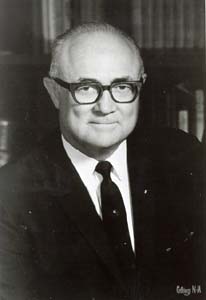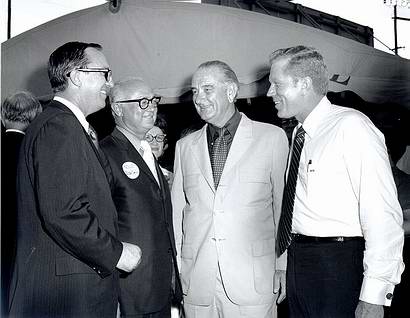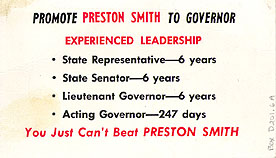
Texas Governor Preston Smith
Former Texas Governor Preston Smith Dies at 91
AUSTIN -- Former Gov. Preston Smith, whose public career began during World War II and ended almost
30 years later in fallout from a major statehouse scandal, died October 18, 2003. Smith was 91.
Smith died at the Texas Tech University Medical Center in Lubbock, Texas, where he had been hospitalized several
days earlier
suffering from pneumonia.
Only a week ago, he had attended a Texas Tech football game, a friend said.
Smith is credited for establishing the medical and law schools at Lubbock's Texas Tech University.
He prided himself as being the first Texas governor from West Texas.
A Democrat, Smith served two terms as governor from January 1969 to January 1973, when terms were for
two years. He was defeated seeking a third term in 1972, a year after the Sharpstown stock fraud scandal
shoock Texas state government.
He attempted a comeback for Governor in 1978 but finished third in the Democratic primary.
In recent years, Smith helped raise money for Texas Tech University and, when asked, would still comment
on state politics.
His signature polka-dot ties notwithstanding, Smith's personal style matched his conservative politics.
But while he was governor he helped boost the future career of a far more colorful figure, the late Bob
Bullock.
Bullock, a gubernatorial aide and secretary of state under Smith, later served 24 years as state
comptroller and lieutenant governor, making strong imprints on state policy and the legislative process.
Bullock died in 1999.
Preston Earnest Smith was born north of Austin on March 8, 1912, in Williamson County, in a small community called Corn Hill.
His family later
moved to West Texas, where he graduated from high school in Lamesa.
He said he first got the idea to run for governor when he was 9.
"I was walking down a cotton row behind a span of mules and reading an old newspaper about Governor
Jim Ferguson," Smith recalled in 1969 to Houston Chronicle reporter Billy Porterfield. "That was the
first time I'd read about a governor, and I decided right then and there I wanted to be governor.
I've worked toward that goal ever since."
He earned a bachelor's degree in business administration from Texas Tech University in 1934, settled in
Lubbock and helped launch a chain of movie theaters.
Smith was elected to the Texas House in 1944 and served three terms there before losing a race for
lieutenant governor in 1950. He was elected to the state Senate in 1956 and served there until he
began the first of three terms as lieutenant governor in 1963.
"Gov. Smith was a creature of the Legislature. He spent much of his career in elective office as a
member of the Legislature, understood the Legislature and worked well with the Legislature," said
lobbyist Mike McKinney, who was on Smith's gubernatorial staff.
McKinney told the Houston Chronicle of stories where Smith could play hardball. In 1969,
Smith signed a bill
providing for a teacher pay raise but vetoed the general state budget. He had to call a special
session for lawmakers to rewrite the budget, but he guaranteed higher teacher pay, which had been a
priority, McKinney said.
As governor, Smith also was instrumental in expanding higher education facilities.
Occasionally, like most public officials, he had to live down embarrassments.
Smith wasn't sure what was going on in 1970, when protesters disrupted his speech at the University of
Houston with chants of "Free Lee Otis!"
The demonstrators were shouting in support of a local black student leader, who had been sentenced in
1968 to 30 years in prison for passing a marijuana cigarette to an undercover officer.
"What in the world do they have against frijoles?" Smith asked, having mistaking the convict's name
for the Spanish word for beans.
Serving with John B. Connally and presiding over the Texas Senate, Smith was able to use his political
and business capabilities to help guide the State of Texas. When Connally announced that he would not
seek reelection, Smith sought to be the next Governor of Texas.
In 1967, five other major candidates, including former Attorney General Waggoner Carr and Secretary
of State John L. Hill, later got into the race.
Smith again finished second in the Democratic primary. He trailed liberal Don Yarborough, who had
almost beaten Connally in 1962 and was making his third race for governor, by 35,000 votes. But he
beat Yarborough by 146,000 votes in the runoff.
Elected in 1968, Smith took office on January 21, 1969.
Smith never was charged with wrongdoing in the Sharpstown scandal, which involved two banking bills
sought by Houston banker-developer Frank Sharp and approved by the Legislature in a special session in 1969.

A portrait of power in Texas in 1970: House Speaker Gus Mutscher, Governor Preston Smith, former
president Lyndon Johnson, and Lieutenant Governor Ben Barnes, at "Gus Mutscher Day" in Brenham,
August 17, 1970. Within two years the political careers of Mutscher, Smith, and Barnes, along with
numerous other officials, would be ended by the Sharpstown stock-fraud scandal.
Smith vetoed the bills, but he and other state officials profited from stock deals involving Sharp's
National Bankers Life Insurance Co. Much of their stock was purchased with unsecured loans from Sharp's
Sharpstown State Bank.
The scandal erupted with the filing of a lawsuit by the federal Securities and Exchange Commission on
the eve of Smith's second inauguration in January 1971, and it plagued the entire 1971 legislative
session and the next year's political campaigns.
Then-House Speaker Gus Mutscher (pictured above), another legislator and an aide to the speaker were later convicted
of conspiracy to accept bribes. The scandel tarnished Smith's career permanently.
Smith finished fourth in the 1972 Democratic primary. Lt. Gov. Ben Barnes, then touted as presidential
material, had challenged Smith but finished third, also a victim of the scandal's fallout.
An Austin outsider, wealthy Uvalde rancher Dolph Briscoe, won the Democratic gubernatorial runoff
against woman's right-advocate state Rep. Frances T. "Sissy" Farenthold. Briscoe then went on to
win the November election.
Smith bitterly blamed the news media's coverage of the Sharpstown scandal for his defeat.
"You can take a subject like that and defeat any candidate," he said in a news conference before
leaving office.
McKinney said the former governor never fully recovered from the experience.
"I think it always bothered him," McKinney said.
"I honestly don't believe he ever thought there was any connection between the stock he bought in the
life insurance company and those two bills that passed the Legislature and he vetoed."
It was widely reported at the time that Smith shared a $125,000 profit on his stock purchase with his
business partner and then state Democratic chairman, Dr. Elmer C. Baum.
But McKinney said Smith always maintained that the profit was made on only half the stock. Overall, the
former governor said he ended up with a loss or no net gain because he held the remainder of the stock
too long.
After leaving office, Smith continued to call himself a "conservative Democrat." But he supported
Republican Ronald Reagan in the 1980 presidential race. And he voted for Republican Bill Clements
against Democrat Mark White in the 1982 governor's race.
Smith's wife, Ima, died in 1998.
